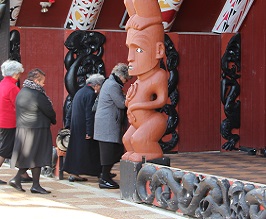Rangatahi Courts & Pasifika Courts
Rangatahi Courts, Ngā Kōti Rangatahi, operate in the same way as the Youth Court, but are held on marae and follow Māori cultural processes. Pasifika Courts also operate in the same way as the Youth Court, but are held in Pasifika churches or community centres and follow Pasifika cultural processes. These Courts are designed to help young Māori and Pasifika young people to engage in the youth justice process. They are also designed to better involve Māori and Pasifika families and communities in the youth justice process.
The courts work within the Youth Court legal structure. The same laws and consequences apply as they would in the Youth Court.
There are 15 Rangatahi Courts around the country, and two Pasifika Courts in Auckland.
Who they are for
The Rangatahi and Pasifika Courts are for young people who have admitted the charges they are facing. After the Family Group Conference (FGC) has decided on a plan for how the young person can take responsibility for what they did, as well as working out how to make sure the young person does not offend again, the young person may be given the opportunity to have this plan monitored by the Rangatahi or Pasifika Court. The FGC may recommend that the plan be monitored by the Rangatahi or Pasifika Court. This means that all Court appearances until the plan is completed will be held on the marae or at a Pasifika venue. Normally, the young person will appear at the Court every two weeks, and each hearing will usually involve the same Judge.
Only young people who have not denied the charge against them may go to a Rangatahi or Pasifika Court.
These courts support tikanga Māori and Pacific Island cultures but they are not exclusively for Māori or Pasifika youth.
What happens at a Rangatahi Court hearing
A typical hearing at a Rangatahi Court will start with a pōwhiri (welcome/calling) of manuhiri (visitors) onto the marae. A morning tea will be served.
The hearing of each young person’s case then starts. Each hearing begins with the young person receiving a mihi (talk) from the kaumātua (respected elders), showing respect to that young person and acknowledging their whanau, hapū and iwi links.
Also at the hearing will be the Judge, Police, kaumātua/kuia, social worker, court staff, whānau, a Youth Advocate (the young person’s lawyer), Lay Advocate and the victim if they choose to attend.
During the time that the young person attends the Rangatahi Court, it is expected that they will learn their pepeha (traditional greeting of tribal identity) with the assistance of their Lay Advocate. At each hearing, the young person will practice delivering their pepeha. The young person may also be encouraged to attend a tikanga wānanga to help them learn more about their cultural identity.
What happens at a Pasifika Court hearing
A typical Pasifika Court hearing will involve a briefing between the Judge and the elders to discuss how each young person is progressing with their plan. Each case will start and end with a prayer. An elder that is from the same cultural background as the young person will talk to the young person and their family, offering encouragement and guidance.

